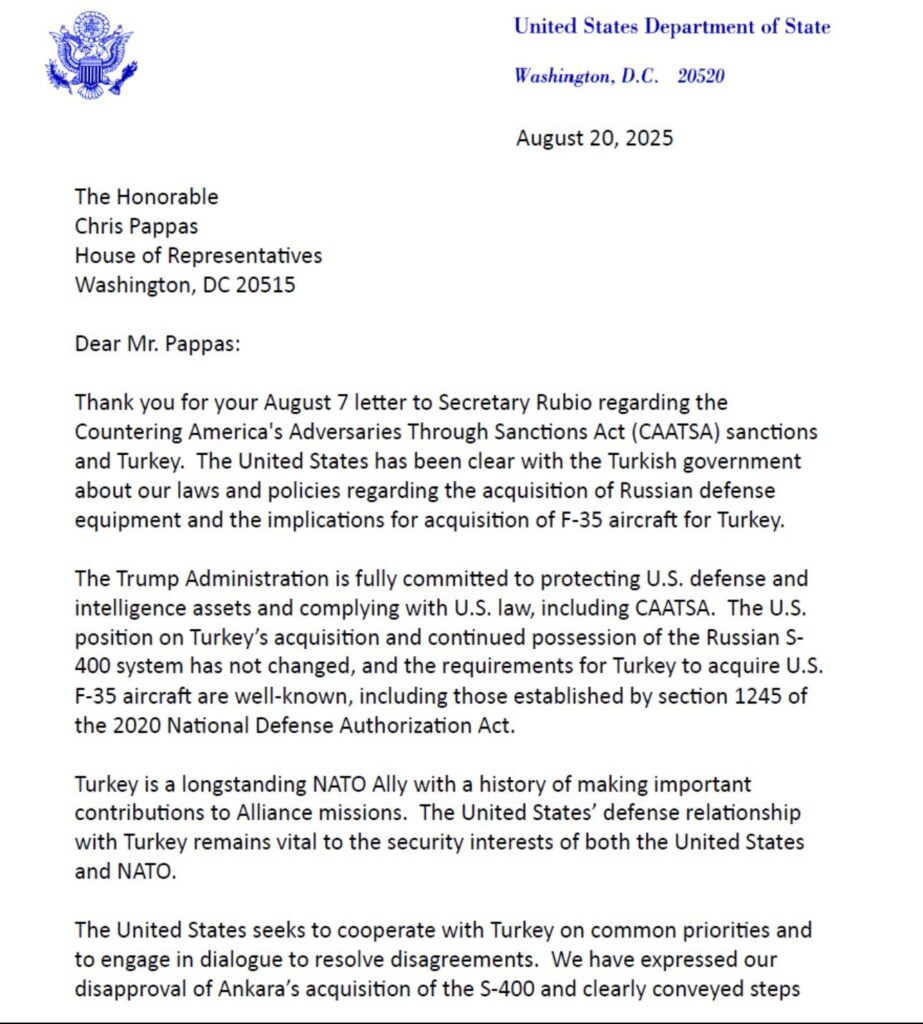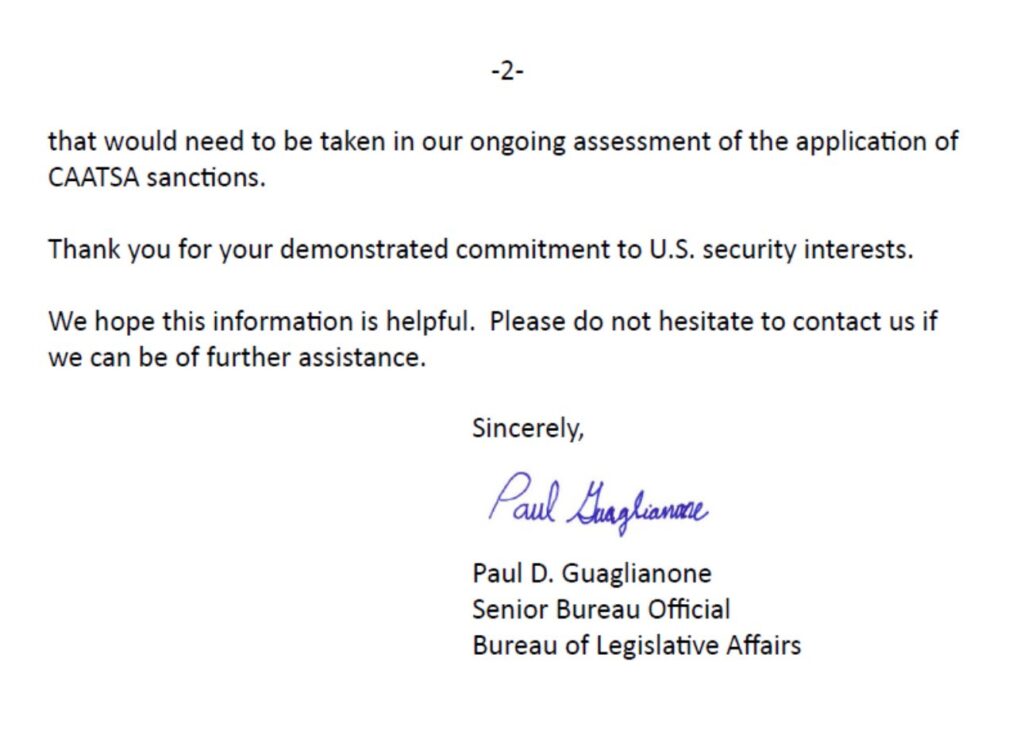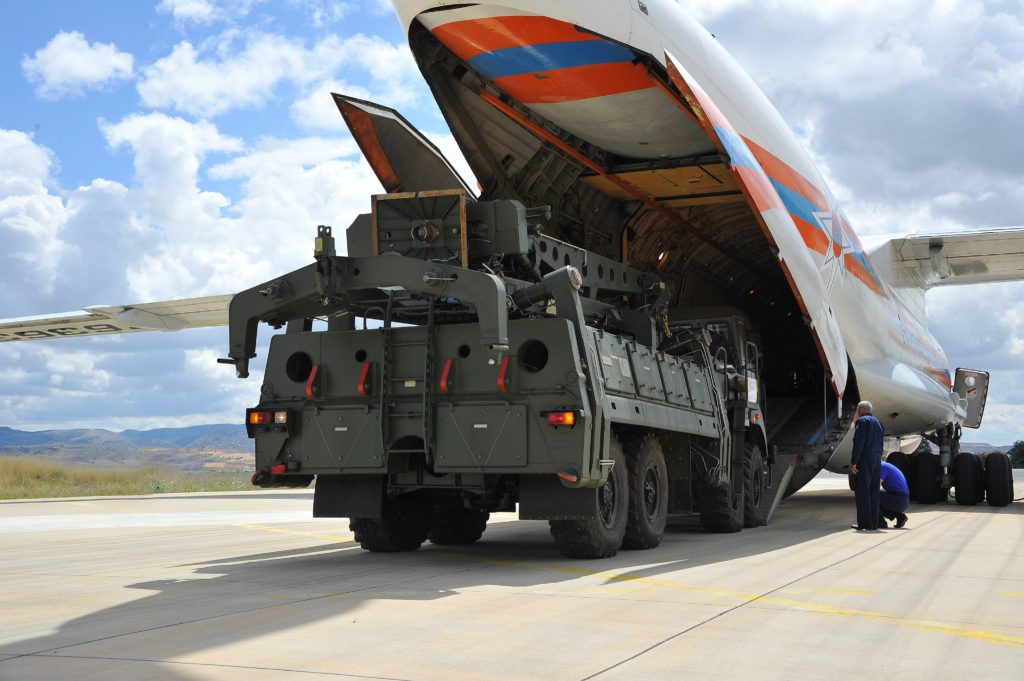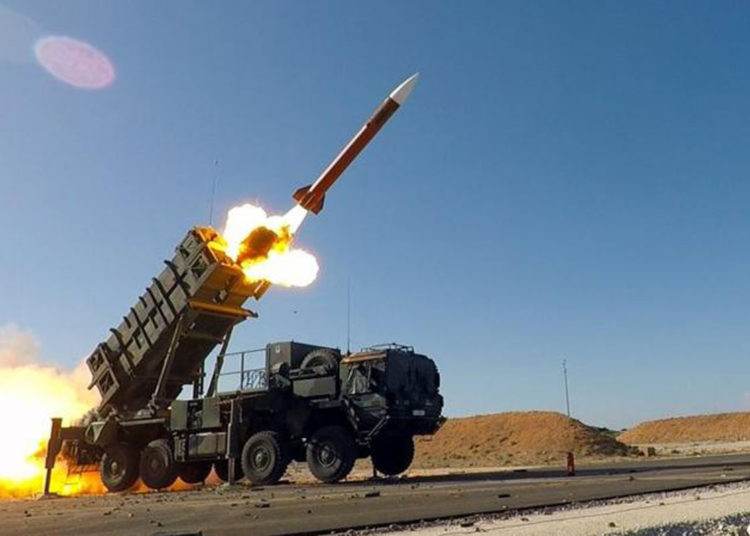A recent letter from a senior US State Department official has confirmed that Washington has not changed its position on Turkey’s acquisition of the Russian S-400 missile defense system, contradicting earlier statements made by Turkish Defense Minister Yaşar Güler suggesting that the issue had been resolved.
The letter, sent by Paul D. Guaglianone, senior bureau official at the Bureau of Legislative Affairs, to Congressman Chris Pappas on August 20, reaffirmed the US government’s continued opposition to Ankara’s purchase and possession of the S-400.
“The US position on Turkey’s acquisition and continued possession of the Russian S-400 system has not changed,” Guaglianone wrote in response to an earlier inquiry regarding US sanctions and Turkey’s future in the F-35 fighter jet program. He added that the requirements for Turkey to rejoin the F-35 program are “well known,” including those outlined in Section 1245 of the 2020 National Defense Authorization Act.
The letter makes clear that the US has not endorsed or approved Turkey’s stance on the S-400 and that Washington continues to view the system as incompatible with NATO defense systems and US law under the Countering America’s Adversaries Through Sanctions Act (CAATSA).


The US clarification comes after Defense Minister Güler told parliament on November 26, 2024, that Turkey and the United States had “reached a consensus” on the S-400 and that the issue “no longer posed a problem.” Güler also claimed that Washington had reconsidered its position on selling F-35 fighter jets to Turkey following progress on Turkey’s domestically developed fifth-generation fighter jet, the KAAN.
However, Guaglianone’s letter shows that no such agreement exists. Instead, the US continues to condition Turkey’s access to the F-35 program on Ankara addressing its possession of the S-400.
Turkey was officially removed from the F-35 Joint Strike Fighter program in 2021 after it took delivery of the Russian S-400 missile defense system in July 2019. The US and NATO had warned repeatedly that the S-400, produced by Russia, posed risks to alliance defense operations and could potentially collect intelligence on F-35 aircraft.
Prior to its removal, Turkey was a production partner in the program and had invested about $1.4 billion. The country had also ordered more than 100 F-35 aircraft. Following its exclusion, six aircraft that Turkey had already paid for were withheld in the US. Those jets remain in storage, with Washington reportedly seeking about $30 million in compensation from Ankara to cover maintenance and storage costs.

Turkey has demanded reimbursement of the $1.4 billion it paid and has called for compensation for damages it claims resulted from its removal from the program.
In his letter Guaglianone reiterated that the Trump administration, and subsequent administrations, remain fully committed to enforcing US law under CAATSA. The law, passed in 2017, requires the imposition of sanctions on countries that conduct significant transactions with Russia’s defense sector.
On December 14, 2020, the US imposed sanctions on Turkey’s Presidency of Defense Industry, known in Turkish as Savunma Sanayii Başkanlığı, and several senior officials due to the S-400 purchase. These sanctions remain in place.
Guaglianone noted that Washington has “clearly conveyed steps that would need to be taken in our ongoing assessment of the application of CAATSA sanctions” but did not specify any changes to current measures.
Although Ankara received two batches of the S-400 system from Russia at a total cost of $2.5 billion, Turkish officials have confirmed that the system remains inactive. Güler has stated that preparations for deployment are complete, with underground storage facilities and designated sites ready. He added that the system could be activated within 12 hours if ordered.
However, the system has not been included in Turkey’s latest air defense strategy, known as the Steel Dome project, approved in August 2024. The initiative is designed to strengthen Turkey’s air defense capabilities but excludes the S-400.
Alongside the controversy over the S-400, Turkey continues to adjust its defense procurement plans.
Güler announced in November 2024 that Turkey would abandon its plan to modernize 79 of its existing F-16 fighter jets with US-supplied kits. Instead, the modernization will be handled domestically by Turkish Aerospace Industries.
At the same time, Turkey has moved forward with the purchase of 40 new F-16 Block 70 Viper jets and associated munitions, a deal valued at between $6.5 billion and $7 billion.
Turkey is also pursuing Eurofighter Typhoon jets as part of efforts to diversify its suppliers. On July 23 the defense ministers of Turkey and the United Kingdom signed a memorandum of understanding that foresees Turkey’s acceptance as a user of Eurofighter Typhoon aircraft. Germany, which had previously blocked the sale, lifted its veto. The Eurofighter is produced by a consortium of the United Kingdom, Italy, Spain and Germany.
Minutes of the parliamentary meeting at which Güler adressed S-400 missiles and F-35 fighter jets.












